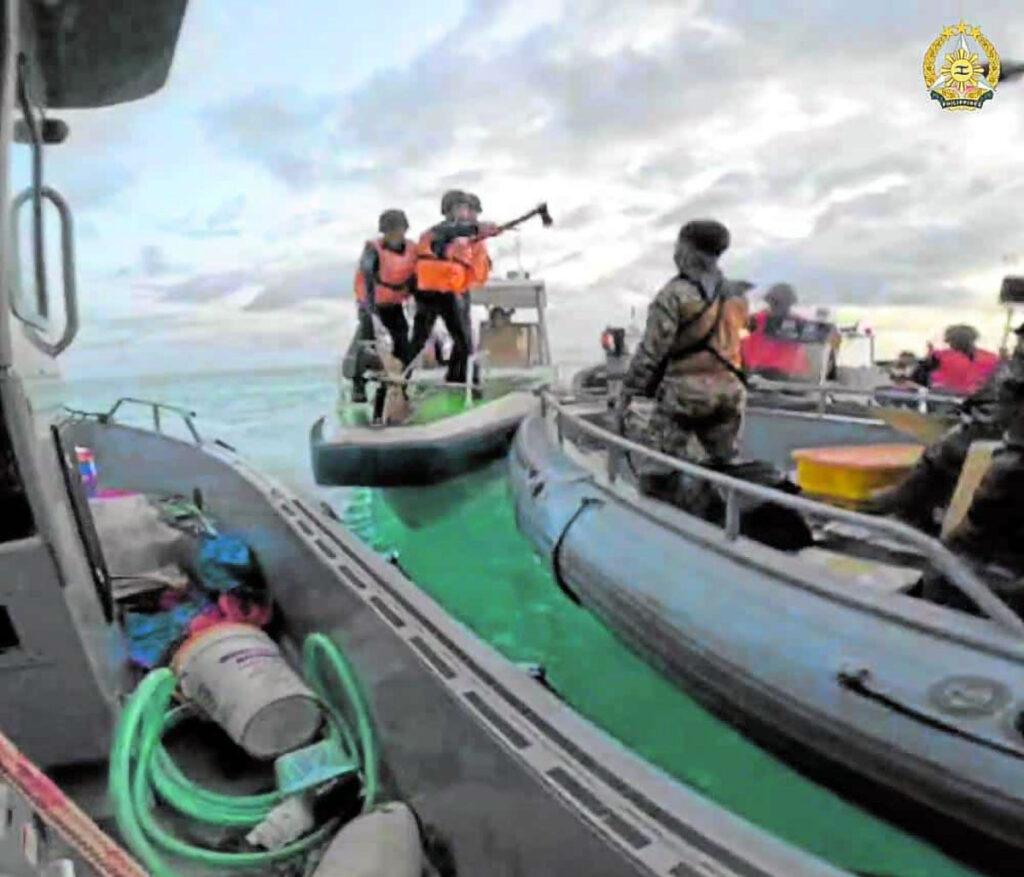
WEAPON IN HAND The Armed Forces of the Philippines, which released this photo on Wednesday, said one of the China Coast Guard members shown here (center) wielded a pickaxe and made threatening gestures in their encounter with Filipino troops on a resupply mission to Ayungin (Second Thomas) Shoal on June 17.
MANILA, Philippines — The Armed Forces of the Philippines (AFP) described China Coast Guard (CCG) personnel, involved in the June 17 “illegal boarding” incident as coming onboard wielding bolos, knives, and spears, and acting like “pirates.”
The AFP was referring to China Coast Guard’s (CCG) latest actions against Filipino troops at Ayungin (Second Thomas) Shoal, a close-quarter confrontation that resulted in injuries, confiscations and equipment damage, and triggered fresh condemnation from Manila and its international allies.
Three days after the June 17 incident, AFP Western Command (Wescom) chief Rear Adm. Alfonso Torres recounted how the CCG personnel “illegally boarded” the Philippine Navy boats then on a resupply mission.
READ MORE:
China Coast Guard boarded PH ships during Ayungin mission – report
West Philippine Sea: Guard PH shoal, fishers with frequent patrols
At a press briefing in Puerto Princesa City in Palawan, Torres said that the CCG personnel seized seven “disassembled” firearms that were “inside gun cases” and therefore were not used during the mission.
The CCG personnel later “deliberately punctured” the navy’s rigid-hulled inflatable boats (RHIBs) using knives and other pointed tools, he said.
‘High-speed ramming’
Tensions began around 6 a.m. on June 17 as the AFP deployed six vessels, including two RHIBs and escort ships, to bring provisions to troops stationed at the grounded World War II vessel BRP Sierra Madre, which serves as the Philippine military outpost at Ayungin.
Torres said one of China’s own RHIBs was used for a “high-speed ramming” of the Philippine Navy boats, one of which was carrying a team that included Seaman First Class Underwater Operator Jeffrey Facundo of the Naval Special Operations Group.
Due to the impact of the collision, Facundo’s right thumb was severed, according to Torres.
In the same press briefing, AFP chief of staff Gen. Romeo Brawner Jr. said the encounter also marked the first time that CCG personnel armed with bolos, spears and knives engaged Filipinos in the West Philippine Sea.
“On the other hand, our troops had no weapons like that,” Brawner said.
‘Bare hands’
He said the AFP had videos taken showing “how the Chinese even threatened our personnel by pointing their knives at our personnel.”
“They fought back with their bare hands,” he said, referring to the Filipinos. “They were preventing the China Coast Guard from hitting them with their bolos and machete and other bladed weapons.”
The Filipino troops were outnumbered by the Chinese forces who came in eight RHIBs, compared to the two Philippine Navy boats that were directly harassed, Brawner added.
“I want to remove the impression that our soldiers just allowed the Chinese coast guard to seize our things and damage our boats. We fought. But then again we have limitations,” he said. “We have arms, but we did not use those. We don’t want to start a war.”
Brawner likened the CCG’s conduct to that of “pirates.”
“For me, this is piracy already. Piracy because they boarded our boats illegally. They got our equipment. Again they acted like pirates for what they did,” he said.
Guidelines
According to Torres, under the Western Command’s operational guidelines when on resupply missions, “no firearms will be handled or shown by our personnel to the China Coast Guard personnel.”
“We are doing that to avoid misperception that we are conducting an armed operation, so the firearms were looted actually and they were disassembled,” he said.
Brawner demanded that the CCG return the firearms that were seized from the Philippine Navy boats and also pay for the damage.
“So our action now is that we are demanding that the Chinese return our rifles and equipment. And we are also demanding from them to pay for the damage that they have caused. They should pay because we will not allow them to just destroy and take our equipment,” he said.
Prior to the press briefing, Brawner went to see Facundo at the Wescom hospital and awarded him with the AFP Wounded Personnel Medal.
He said Facundo’s “morale remains high” and that the wounded Philippine Navy sailor was willing to go back to the West Philippine Sea to serve there.

